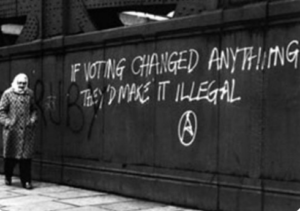On this holy day of voting in America I am blasphemer supreme. Below is a reprint of an essay by French writer Ocatave Mirbeau from 1902 disseminating why it was a waste of time to vote a hundred years ago in France, and funny enough it’s still true today all over western society, which is most of the world now. And like all the major common problems in society from before (war, poverty, inequality, incarceration, corruption, etc), the same issues persist now despite all the so called “progress” we have made. 
The Voters Strike
by Octave Mirbeau
There’s something that astounds me enormously. In fact, I’d even say that it stupefies me, and that’s that at this scientific moment when I’m writing, after countless experiences, after daily scandals, there can still exist in our dear France (as they say at the Budget Commission) one voter, one single voter – that irrational, inorganic, hallucinatory animal – who consents to put a halt to his affairs, his dreams, and his pleasures in order to vote in favor of someone or something. If we think about it for just one instant, is this surprising phenomenon not one fit to confuse the most subtle philosophers and confound reason? Where is the Balzac who can give us the physiology of the modern voter, or the Charcot who will explain the anatomy and mentality of this incurable lunatic? We are waiting for him.
I understand that a swindler will always find stockholders, the censor his defenders, the Opéra-Comique dilettanti, the “Constitutionnel” subscribers, and M. Carnot painters to celebrate his triumphant and rigid entry into a Languedocian city. I understand M. Chantavoine obstinately seeking rhymes. I understand everything. But that a deputy or a senator or a president of the republic or no matter which of the strange comedians who seek elective office of whatever kind finds voters, that is to say the undreamed of being, the improbable martyr who feeds you on his bread, clothes you in his wool, fattens you on his flesh, and enriches you with his money with the sole aim of receiving in exchange for his prodigality truncheon blows on the neck, kicks in the behind, and shots in the chest. In truth, this is far beyond the already pessimistic ideas I had heretofore held concerning human stupidity in general and French stupidity in particular, our dear and immortal stupidity.
It is understood that I am speaking here of the informed and convinced voter, the theoretician-voter, of he who imagines, the poor devil, that he is performing the act of a free citizen, demonstrating his sovereignty, expressing his opinion, imposing – Oh admirable and disconcerting folly! – political programs and social demands, and not of the voter “who knows what’s what,” who sees in “the results of his omnipotence” an amusement à la charcuterie monarchiste or a feast au vin républicain. The sovereignty of the latter consists in getting drunk at the expense of universal suffrage. He knows the truth, for that alone matters to him and he doesn’t care a fig for the rest. He knows what he’s doing. But the others?
Ah, yes, the others. The serious, the austere, the sovereign people, those who feel drunkenness steal over them when they look at themselves and say, “I am a voter! Nothing happens without me. I am the foundation of modern society. By my will Floquet makes laws which bind 36,000,000 men, and Baudry d’Ausson as well, and Pierre Alype too.” How can it be that there are still people like these? How is it that however stubborn, proud, and paradoxical they might be they are not yet discouraged and ashamed of their labors? How is it possible that there can anywhere be met, even in the furthest corners of Brittany, a man stupid enough, so lacking in reason, so blind to what can be seen, so deaf to what can be heard as to vote white, blue, or red without there being anything that forces him to, without his being paid or made drunk?
What baroque sentiment, what mysterious suggestion does this thinking biped – gifted, it is claimed, with a will – obey, who goes along proud of his right, certain that he is fulfilling an obligation in depositing some ballot in some voting box, it mattering little what name is written on it. What can he tell himself that justifies or even explains this extravagant act? What is he hoping for? For after all, in order to consent to giving himself greedy masters who rob and murder him he must tell himself and hope for something extraordinary that we don’t suspect. It’s necessary that by some powerful cerebral deviation the idea of a deputy corresponds in him to ideas of science, justice, devotion, labor and probity. It’s necessary that he discover a special magic in the mere names of Barbe and Baihaut, no less than in those of Rouvier and Wilson, and that he sees flower and blossom like a mirage promises of future happiness and immediate relief in Vergoin and Hubbard. And this is what is truly frightening. Nothing teaches him anything, neither the most burlesque of comedies nor the most sinister of tragedies.
And yet the world has gone on for centuries, societies have developed and succeeded one another, each like the one preceding it, and one fact dominates all of history: the protection of the mighty and the crushing of the weak. The weak don’t understand that they have only one historical raison d’être, and that’s to pay for a bunch of things they’ll never get to use and to die for political schemes that have nothing to do with them.
What does it matter to them that it’s Pierre or Jean who asks them for their money and takes their life from them, since they have to despoil themselves for the latter and to give the former? But no! But they have preferences among those who rob from them and those who execute them and they vote for the most rapacious and the most ferocious. They voted yesterday, they’ll vote tomorrow, and they will always vote. Sheep go to the slaughter; they say nothing and they hope for nothing. But at least they don’t vote for the butcher who will kill them and the bourgeois who will eat them. More beastly than the beasts, more sheepish than the sheep, the voter names his butcher and chooses his bourgeois. He has made revolutions to conquer this right.
* * *
O good voter, unspeakable imbecile, poor slave: if instead of allowing yourself to be taken in by absurd stories issued every morning by the penny newspapers big and small, blue and black, white and red and that are paid to have your skin; if instead of believing the chimerical flattery with which they caress your vanity, which they surround your pitiful rag-clad sovereignty with, if instead of stopping as an eternal passerby before the heavy dupery of programs you would sometimes read by the fire Schopenhauer and Max Nordau, two philosophers who know all that needs to be known about your masters and yourselves, perhaps you’d learn some surprising and useful things. And perhaps after having read them you’d be in less of a hurry to put on your serious air and your lovely waistcoat and hurry to the homicidal urns where, whatever name you put in them, you’re putting the name of your most mortal enemy. They’ll tell you, as connoisseurs of humanity, that politics is an abominable lie, that everything there is the opposite of good sense, justice and right and you have nothing to hope for from it, you whose accounts are settled in the great book of human destinies.
Dream after that if you like of a paradise of light and perfume, of impossible fraternity, of unreal happiness. It’s good to dream, and it eases suffering. But never mix man in with your dreams, for wherever man is there is pain, hatred, and murder. Above all, remember that the man who solicits your suffrage is, by this very fact, a dishonest man, for in exchange for the situation and the fortune you propel him towards he promises you a bunch of marvelous things that he won’t give you and that aren’t not in his power to give you, anyway. The man you elevate represents neither your poverty nor your hopes nor anything else about you. He only represents his own passions and interests, which are the opposite of yours. In order to comfort you and revive your hopes – which will be quickly deceived – don’t imagine that the distressing spectacle that you today see before you is peculiar to an era or a regime and that it will pass. All eras are equal, and so are regimes, that is, they are equally worthless. And so, good man, go home and go on strike against universal suffrage. You have nothing to lose in doing this, of this I can assure you, and you might amuse yourself for a time. In your doorway, closed to the beggars of political alms, you’ll watch the brawl pass by, silently smoking your pipe.
And if he exists in some unknown place, an honest man capable of governing you and loving you, don’t feel bad for him. He’ll be too jealous of his dignity to mix in with the filthy party struggle, too proud to feel he owes you for a mandate that you only ever grant to cynical daring, insult, and falsehood.
As I told you, good man, go home and go on strike.




You must be logged in to post a comment.